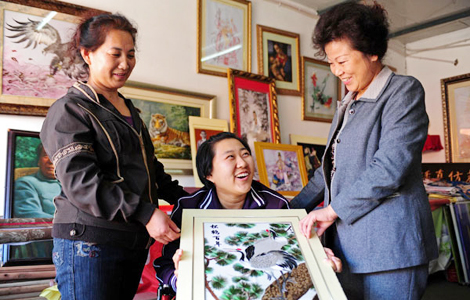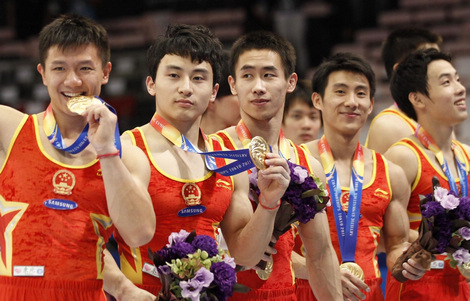Despite unexpected costs, 'we need the best for our girls'
Updated: 2011-10-13 08:19
By Wu Yiyao (China Daily)
|
|||||||||||
SHANGHAI - Grace Liao, a mother of two girls, didn't panic until she was told that neither of the two kindergartens she had applied to would offer a place to her younger daughter.
"Your child was on a waiting list but there is no vacancy this year," she was informed.
That was in early June, and classes would start in three months.
Liao, 32, said she had thought securing a class for 3-year-old Doris would be as easy as for elder daughter Melisa two years ago. The process then had taken only 15 minutes filling out a form and a five-minute interview.
"I did not realize that things have changed so drastically," Liao said. "When my friends advised me to act as early as possible to secure a place for my second daughter, I thought there was no need to hurry. Now I see that the competition started in March."
Melisa entered a public kindergarten in the family's neighborhood in Minhang district two years ago. Liao liked the kindergarten: The monthly charge is only 800 yuan ($126), teachers are nice to the kids, and the food service is good.
"I thought that since my elder daughter has been admitted to the school, and I am quite familiar with the teachers, they would consider my application first," Liao said. But when she went to the kindergarten on application day, she was told that all seats had been filled.
"The teacher told me that far too many kids applied this year, and unless I knew someone working in education - authorities who would write a note giving privileges to my application - it would be impossible to get a place in the public kindergarten," she said.
Jumped at a chance
Liao doesn't know anyone with that kind of pull, so she had to turn to private kindergartens. "I thought that since they charge more, there would be fewer applicants and might be plenty of places, plenty of opportunities for my kid."
So on a day in early July when the temperature hit 38 C, Liao went to a private kindergarten to meet the teachers. She found that she was wrong again.
"I was told that only nursery class had one place left, which is for toddlers aged 2, but my younger daughter needs to go a class for kids between 3 and 5," Liao said.
When it became clear she was desperate, teachers told her about a bilingual preschool that had one place available. It charges 3,400 yuan a month.
Liao took the place without hesitation, although the fee is more than four times that at the public kindergarten she had considered.
"The private kindergarten has a good reputation for its bilingual teaching, which will enable my second daughter to speak both English and Chinese fluently," Liao said.
When she visited the school, she came away with a list of advantages: "The playground is spacious, so my daughter would have a nice place to play. The lunch menu is well designed, so my daughter will have nutritious meals. The teachers are smart and well trained, so my daughter will receive good education. The security guards are very cautious, so my daughter will have a safe stay."
Unfair advantage?
Liao does worry that having Doris in private kindergarten and Melisa in public school will put the girls on different tracks. They will receive different early education, so their future academic performance may be quite different.
"It is unfair to put one in the Chinese-only school and another in a bilingual school. Some of Doris' classmates will be foreign kids, so she may have a global perspective at a very young age," Liao said.
Then there's a practical problem: She had hired only one nanny to pick up both girls after school, but the two kindergartens aren't close, and she and her husband can't leave their jobs to help.
So she decided she would hire another nanny. And the costs keep rising.
"I have calculated the expenses," Liao said. "My husband and I will pay at least 8,000 yuan a month for preschool education, which is more than half of our disposable monthly income."
She said the money includes sending Melisa to English classes, to catch her up with Doris in language proficiency, plus reading materials for the girls and money paid to nannies who will pick up them up.
Liao finds it "a little depressing" that wealthy parents have easier access to preschool. "The financial burden will be huge," she said "but my husband and I have decided that we need the best for our girls, especially in terms of education."
Hot Topics
Libya conflict, Gaddafi, Oil spill, Palace Museum scandal, Inflation, Japan's new PM, Trapped miners, Mooncake tax, Weekly photos, Hurricane Irene
Editor's Picks

|

|

|

|

|

|







